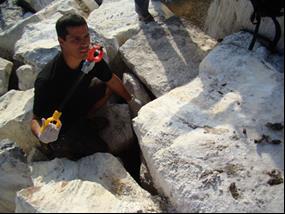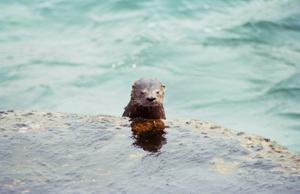Juan Valqui
This project aims to determine the genetic status of the population of the marine otter (Lontra felina) contributing to the conservation management of this endangered species. During the field work, educational work will be done in fishing villages.

Collecting samples between the rocks.
The marine otter’s (Lontra felina) historical distribution has been reduced in the last decades due to anthropogenic factors such as habitat destruction, pollution, poaching, bycatch and dynamite fishing. While less than 700 individuals are estimated for Peru at present, it is likely that the population will decrease by at least 50% in the next 30 years. Therefore, the smallest marine mammal of the world is listed as Endangered by the IUCN, in Appendix I of the Convention on International Trade in Endangered Species of Wild Fauna and Flora (CITES), in Appendix I of the Convention of Migratory Species (CMS), and it is protected by Peruvian law.

The marine otter Lontra felina.
There are few studies about the status of the marine otter population which consist of basic censuses and evaluation of threats, resulting in divergent results (population numbers between 200 and 700 individuals) and leaving yet unclear what the real state of the otter population is. Knowledge on genetic variability and structure, is therefore of great relevance to establish conservation measures in the future.
Important questions that will be addressed in this study are:
-What is the genetic variability of the population?
-What is the real size of the Lontra felina population in Peru?
Is inbreeding a possible threat to the genetic composition of the population?
Are there subpopulations which might show patterns of isolation by distance?
The field work of this study consists of a completely non-invasive sampling along 2000 km of Peruvian coast, mainly rocky patches, ports and islands, from Vesique (Department of Ancash) to Vila Vila (Department of Tacna). Scat samples and rests of dead otters will be collected and send to the Zoological Institute of the Christian-Albrechts-University in Kiel, Germany for DNA-extraction, amplification and sequencing. The results about the genetics and population structure of the marine otter will be published in scientific journals and will provide solid arguments in the conservation management of the species in Peru.
In cooperation with Pro Delphinus, workshops will be held at artisan fishing ports during the field work. Local kids –the future fishermen– will learn about the importance of nature conservation in their country. This projects aims to get local communities involved in the efforts of protecting endangered species and their habitat along the Peruvian coast.